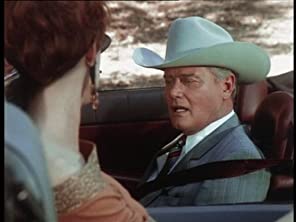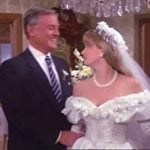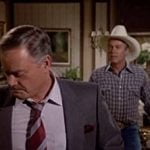
S14E06

S14E06
Table of Contents
Toggle
On April 2, 1978, when Dallas first aired on CBS, viewers were introduced to oil baron J.R., played by Larry Hagman – a man with big dreams and even bigger ambitions. He had his sights set on becoming the biggest player in Texas’ oil industry and nothing would stop him from achieving it — except maybe his own brother Bobby (Patrick Duffy). This rivalry between two brothers made for some pretty intense TV drama during its 14-season run, as they fought over business deals while juggling complicated family dynamics along the way.
The good ol’ days of watching these two fight over control of Southfork Ranch may be gone now, but our fascination with J.R.’s cunning ways still remains strong today. So let’s dive into what made this complex character so captivating and why generations have continued to embrace him since then.
J.R. Ewing is one of the most iconic characters in television history and a staple of prime-time soap operas. He’s a complex antihero, head of the powerful Ewing family dynasty and star of the hit TV series Dallas. J.R.’s cunning schemes, endless ambition and outrageous behavior made him an unforgettable presence on small screens across America for over a decade.
Although he started out as a caricature villain—the kind that viewers loved to hate—over time we came to understand his motivations better and sympathize with him more and more. No matter what chaos J.R. caused, you could always count on him to be loyal to his family, even if it meant making morally questionable decisions along the way.
He was also known for inspiring some truly memorable quotes like “Victory is sweetest when you’ve known defeat,” which will remain part of popular culture forever. With such an indelible legacy, it’s no wonder why J.R. has become a pop culture icon over 40 years after first appearing on our screens – proving life really can imitate art sometimes.

J.R. Ewing was the Texas oil tycoon who captured America’s hearts and minds when he first appeared in Dallas, the long-running TV series of the late 1970s and early 1980s. He grew up on Southfork Ranch, a huge estate owned by his family that served as the setting for much of the show’s drama.
Possessing an ambitious drive to succeed, J.R. quickly rose through the ranks at Ewing Oil and became its ruthless head honcho – often going toe-to-toe with other business rivals in pursuit of success. His cunning plans to outwit others were legendary; his stubbornness kept him constantly engaged in power struggles over control of Southfork’s precious resources.
But underneath it all, despite being portrayed as a scheming villain, there was something endearing about J.R., which is why so many viewers tuned into Dallas every week just to see what trouble he’d get himself into next.
When Larry Hagman took on the role of J.R. Ewing in 1978, he did so with aplomb – adding an extra layer of complexity to the character that had been missing from previous iterations. With his suave mannerisms and devilish grin, it was no wonder why audiences fell in love with J.R., despite his Machiavellian ways. His larger-than-life presence made Dallas one of television’s most beloved prime-time soap operas and cemented him as one of pop culture’s most iconic villains ever since.
It wasn’t just viewers who adored J.R.’s charm either; other cast members like Patrick Duffy (who played Bobby) or Linda Gray (Sue Ellen) praised their colleague for bringing out their best performances too. It seemed everyone wanted to work alongside America’s favorite villain, making sure every scene featuring J.R. was electric with tension and never lacking drama.
Larry Hagman also understood how important it was to keep the audience guessing about what kind of person J.R. really was beneath all his schemes – which is why we still can’t help but root for him even now, decades after he first graced our screens. As such, Hagman will forever be remembered as the man who brought this Texas oil tycoon back into our lives again – allowing us to experience a world where ‘the ends justify the means’ has never felt more exhilarating than when watching J.R..

The Ewings were a family of powerful businessmen, who built an empire on the vast reserves of oil underneath Dallas. Led by J.R., the Texas business dynasty consisted of his father John Ross ‘Jock’ Ewing and brothers Bobby and Gary – all determined to outsmart their rivals in order to secure more wealth. Of course, they weren’t above playing dirty either; it wasn’t uncommon for them to break any laws or ethical codes if it meant getting ahead. They had no qualms about using blackmail, bribery and intimidation tactics too – proving that money was always at the forefront of their minds.
Though their legacy is often shrouded in controversy due to moral ambiguity surrounding their operations, there’s no denying that thanks to J.R., the Ewings have become synonymous with ambition and power within pop culture today. Whether we love them or loathe them, one thing is certain: without this bold businessman from Texas, we may never have been able to witness just what lengths people will go through in pursuit of money…
It’s clear that J.R. Ewing has left a lasting legacy in popular culture – and not just through the Dallas TV series itself. His character is often cited as one of the most iconic villains in television history, captivating millions with his devious schemes and never-ending ambition for power. He also helped define the genre of prime-time soap operas; before Dallas premiered there were few shows on air featuring large casts, intertwining storylines and dramatic cliffhangers.
But it was thanks to J.R.’s manipulative ways that viewers everywhere began tuning in week after week to witness all kinds of outrageous behavior – from high stakes business deals to illicit affairs between family members – proving that drama can be both fascinating and entertaining at the same time. It wasn’t long until other networks followed suit with their own versions too; Dynasty, Falcon Crest and Knots Landing are only some examples of how this cultural phenomenon became so mainstream over time.
The impact of J.R.’s legacy is undeniable; without him, we wouldn’t have seen such an enduring shift in entertainment media production or consumption habits today. From characters’ motivations to plotlines, these elements are still heavily influenced by what made Dallas one of the biggest successes ever aired on television– proving once again why J.R.’s influence continues to remain relevant even decades later.

J.R.’s influence on the genre of prime-time soap operas is undeniable. His character, and the way he was written and portrayed in Dallas, revolutionized this type of television programming by introducing a new level of depth and complexity to storylines – something that had never been seen before. J.R.’s devious schemes, ambitious nature and larger-than-life personality allowed viewers to watch characters with real motivations who weren’t afraid to take risks or challenge conventions.
This shift in storytelling opened up an entirely new world for audiences; one where relationships between family members could be explored more intimately than ever before – leading viewers to become emotionally invested in these characters and their lives like never before. It also paved the way for other networks to follow suit; Dynasty, Falcon Crest and Knots Landing are only some examples of how successful this style became as it gained popularity over time.
It’s clear that without J.R., we wouldn’t have such an enduring impact on today’s entertainment landscape. From high stakes business deals to illicit affairs between family members, his legacy continues to live on – proving once again why he remains one of the most iconic villains in television history.
J.R.’s relationships with other characters were complex and often volatile, but they were also essential to his character development throughout the series. His most significant relationships included that of Sue Ellen Ewing – his wife and mother of his son John Ross, Cliff Barnes – a family rival he was constantly trying to outwit; and Jock Ewing – his father who disapproved of many of J.R.’s schemes.
Sue Ellen became increasingly disenchanted with J.R.’s behavior over time, yet she remained devoted to him despite all the turmoil between them. Their relationship mirrored how complicated it can be for spouses when one is determined to make their own way in life without any regard for the consequences on others.
As for Cliff, he served as an ongoing antagonist whose attempts at thwarting J.R.’s plans only drove him further into Machiavellian territory as he employed whatever tactics necessary to get what he wanted – even if it meant sacrificing ethics along the way.
Finally, Jock’s disapproval of J.R.’s lifestyle put tremendous strain on their dynamic, pushing both men towards strained reconciliation or utter estrangement depending on which season you watched.
These intense relationships gave viewers a unique insight into human nature by exploring themes such as ambition versus morality, loyalty versus betrayal and respect versus defiance – something that paved the way for future storylines involving J.R.’s character that would captivate audiences across generations more than four decades later.

The storylines involving J.R.’s character were integral to the series’ success, as his schemes, feuds and plots provided drama and intrigue for viewers. His Machiavellian plans often resulted in huge payouts for himself and those close to him, though these gains usually came at a cost – both financially and emotionally. Whether it was manipulating business deals or orchestrating complex revenge strategies against enemies like Cliff Barnes, J.R. consistently pushed boundaries when it came to achieving what he wanted, no matter how shady his tactics might have been.
At times, this led to moments of self-reflection where J.R. questioned if such actions were really worth all the trouble they caused – especially considering the damage that could be done to family relationships in the process. This very human struggle between ambition versus morality is one of many themes associated with his character, which ultimately made him so beloved by audiences around the world.
Ultimately, while he may have sometimes gone too far with some of his more nefarious deeds, there’s still something undeniably captivating about watching someone fight tooth and nail to get what they want despite any obstacles standing in their way – even if it means having to live with the consequences afterwards…
J.R.’s character is widely associated with numerous themes, ranging from ambition and power to manipulation and greed. These are all facets of J.R.’s personality that he used to get what he wanted – no matter the cost. He was a masterful schemer who often took risks in order to achieve his goals, oftentimes leading him down paths that put both himself and those around him in danger or harm’s way.
At its core, this speaks to an underlying desire for freedom; one which many can relate to on some level due to our own ambitions as well as the world we live in where certain freedoms may not be available without taking such extreme measures. This rebellious spirit has been seen throughout history, making it easy for viewers to sympathize with J.R., even if they don’t condone his actions at times.
The appeal of J.R.’s character also lies in how complex and multi-faceted it is: while he could come across as ruthless and cutthroat when pursuing his objectives, there were moments when he showed genuine empathy towards others – especially those closest to him like family members or business partners – proving that beneath the surface lay someone capable of kindness despite their flaws.

J.R.’s transformation over the series’ run was as captivating to viewers as it was complex. As he evolved from a ruthless, conniving businessman into a more caring character, fans were treated to an exploration of his inner struggle between ambition and morality — and how this affected both him personally and the Ewing family dynamics around him.
His journey towards redemption began with moments of selflessness that revealed the softer side beneath the hard exterior; situations where J.R. would sacrifice for those he loved despite having nothing in return. Simultaneously, we witnessed hints of guilt stemming from his past actions begin to take shape during these scenes — adding further depth to his development arc by showing us that even one such as himself is capable of finding remorse when given time to reflect on their choices.
It’s easy to see why these changes had such a powerful impact on viewership ratings: not only did they keep audiences guessing about what J.R. might do next but also gave them hope that maybe he wasn’t so beyond saving after all – something which kept people coming back again and again until Dallas ended its successful run years later. The transition here seamlessly leads into exploring just how much influence J.R.’s story had on others…
J.R.’s captivating transformation over the series’ run undeniably had a major impact on viewership ratings, as fans couldn’t help but be drawn in by his inner struggle between ambition and morality. This was further highlighted with each new episode that aired — often leaving viewers both eager to see what would happen next and fearful of how it might affect their beloved character.
The show’s popularity peaked during its ninth season when J.R.’s story arc took center stage; a moment which not only saw the highest average Nielsen rating in US television history (at 41.5), but also demonstrated just how powerful an influence he’d had on those around him – from family members to total strangers who were swept away by his charisma and charm.
It goes without saying that Dallas wouldn’t have become one of the most renowned TV shows ever made if it weren’t for J.R., whose compelling journey towards redemption kept audiences enthralled until the very end and beyond. With this in mind, let us now explore some of the awards and notable nominations won throughout its run…

It’s no surprise that J.R.’s iconic status has seen him become synonymous with some of the most memorable quotes and catchphrases in modern television history. From his calculating scheming to his larger-than-life attitude, it seemed like he had a phrase for every situation — many of which are still quoted today.
One particular quote often repeated is “Once you get rid of integrity, the rest is easy” — demonstrating how much power he held over those around him when it came to getting what he wanted. Another popular line is “I never lose”, reflecting just how confident and self-assured J.R. was even in the face of seemingly insurmountable odds.
In addition to this, there were various phrases associated with his character such as ‘king of the jungle’ or ‘nobody messes with J .R.,’ alluding to his tough exterior and willingness to do whatever it took to come out on top. All these lines have stood the test of time; they continue to be recognized by fans old and new alike and serve as an evergreen reminder of why we loved watching him so much back then.

In conclusion, J.R. Ewing was an unforgettable character in the long running TV series Dallas and will forever be remembered as one of television’s greatest villains. He remains a fan favorite to this day due to his unique combination of charisma and ruthlessness. Larry Hagman’s portrayal of J.R. also helped make him such a memorable figure on the small screen, with many fans continuing to quote his most famous lines decades later. His legacy is undeniable; since appearing on Dallas, J.R.’s influence has spanned media outlets from film to literature, cementing him as one of pop culture’s most iconic figures. There’s no doubt that J.R., thanks to his larger-than-life persona and ambition for power, will continue to remain firmly entrenched in our collective imagination for years to come.
Click on a star to rate it!
Average rating 0 / 5. Vote count: 0
No votes so far! Be the first to rate this post.
We are sorry that this post was not useful for you!
Let us improve this post!
Tell us how we can improve this post?
Before retirement, Dora was the editor and publisher of various online magazines. For example, she edited and published GEnie Lamp – an online magazine for General Electric’s Information Service (GEIS) – and the BBS Magazine, TeleTalk Online.
Now retired, Dora and her husband, Mike, enjoy RV traveling, camping, and meeting fellow campers.